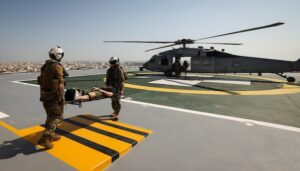
Story by 1st Lt. Michelle Lin
Task Force 51/5th Marine Expeditionary Brigade
BAHRAIN – On September 23, 2024, U.S. Naval Forces Central Command (NAVCENT) and Task Force 51/5th Marine Expeditionary Brigade conducted integrated air medical evacuation training with the Bahrain Defense Force Royal Medical Services (BDF RMS).
This training improved collaboration between the U.S. military and BDF regarding patient MEDEVAC and en-route care by establishing effective protocols for future real-world operations.
Comprised of Marines, Sailors, and BDF RMS personnel with civilian doctors and nurses, the team worked together on the roof of King Hamad University Hospital at a newly renovated landing zone constructed earlier this year. Helicopter Sea Combat Squadron (HSC) 26, part of Combined Task Force (CTF) 53, provided air transport, enabling the team to practice triaging, packing, and loading two simulated patients onto the helicopter. Following initial treatment, the team conducted communication drills focused on transfering patients to higher echelon of care.
“Using our air assets, we mitigate the need to deal with traffic and travel to the gate,” said U.S. Navy Lt. Freddie Mawanay, NAVCENT Director of U.S. Navy Global Health Engagement. “Before, we could not access the tarmac where the plane lands. The newly established landing zone has drastically improved our processes and access to partner nation medical capabilities, ultimately increasing the survivability of casualties.”
Task Force 51/5 has conducted training events of similar size and scope with the BDF in the past to ensure regional security. This training was made possible with support from CTF-53’s HSC-26.
“We had a valuable opportunity to collaborate with King Hamad University Hospital and enhance our understanding of Bahrain’s communication, transportation, and treatment plans for injured U.S. service members,” stated U.S. Navy Lt. Lauren Greenberg of HSC-26 and aircraft commander for the exercise. “We look forward to assisting with training for local personnel in the Kingdom of Bahrain.”
By the end of the drill, the team successfully established a sustainable MEDEVAC process for casualties, using BDF medical support and ensuring interoperability with the Expeditionary Resuscitative Surgical Systems. This approach also demonstrated effective capabilities for ship-to-shore operations.
Task Force 51/5’s training with the host nation is vital to maintaining critical response capabilities in the U.S. Central Command area of operations for potential employment and real-world crisis reaction.